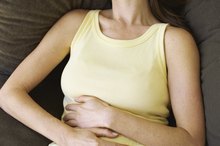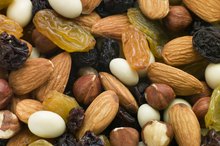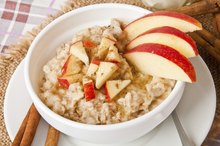Diet Following a Sigmoid Colectomy
The sigmoid colon is the terminal section of your large intestines that attaches to the rectum and anus -- a sigmoid colectomy is a surgical procedure in which the sigmoid colon is resected. During this procedure, the sigmoid colon is removed and the remaining large intestine is then reattached to the rectum, according to the University of Chicago. After the procedure, you will need to eat certain foods to allow your intestines to heal, as well as to prevent gastrointestinal upset such as diarrhea, constipation and excessive gas.
Diet
You need to follow a low-fiber diet for about six weeks after you are discharged from the hospital. The University of Chicago explains that a low-fiber diet is imperative for post-colectomy patients to decrease the risk of trauma to the intestines and promote healing 3. After six weeks, slowly introduce fiber back into your diet. Increase your fiber intake by only one serving each day, until you are able to tolerate 20 grams to 35 grams per day, or about five servings. Be sure to drink plenty of water while increasing your fiber. Fiber can be constipating when not complemented with adequate water.
- You need to follow a low-fiber diet for about six weeks after you are discharged from the hospital.
- Increase your fiber intake by only one serving each day, until you are able to tolerate 20 grams to 35 grams per day, or about five servings.
Recommended Foods
Which Foods Are Good to Eat After Gallbladder Surgery?
Learn More
Eating foods that are low in fiber, soft and easy to digest will help to decrease your risk of diarrhea.
Foods to Avoid
Foods that are high in fiber, hard, fatty or spicy should be avoided immediately after surgery, as these can cause gastrointestinal upset. This includes whole-grain cereals, whole-grain bread, raw vegetables, raw fruits and tough meats. Foods that may precipitate diarrhea include:
- broccoli
- spinach
- dried beans
- baked beans
- chocolate
- caffeine
- red wine
- prune juice
- beer
Foods that are associated with an increase in gas or flatulence include
- citrus fruits
- apricots
- bananas
- raisins
- brussels sprouts
- carrots
- cabbage
- eggplant
- onions
- beans
- bread
- wheat germs
- potatoes
- milk
- dairy products
- fatty foods
Considerations
Food Permitted to Eat After Intestinal Surgery
Learn More
It is common for individuals to experience diarrhea, constipation and gas after a sigmoid colectomy. This is normal. Your body needs time to replace enzymes and bacteria that help to process parts of the food you eat that are not digested.
Caution
Contact your doctor if you have signs or symptoms of an infection. This may include a fever of greater than 101 degrees Fahrenheit or an incision that is red, swollen, feels warm or is draining. Your doctor should also be notified if you have frequent diarrhea or vomiting, constipation, blood in the stool, stool that appears black or tarry, worsening abdominal pain, chest pain or shortness of breath, swelling of the legs or changes in the incision site.
- Contact your doctor if you have signs or symptoms of an infection.
- Your doctor should also be notified if you have frequent diarrhea or vomiting, constipation, blood in the stool, stool that appears black or tarry, worsening abdominal pain, chest pain or shortness of breath, swelling of the legs or changes in the incision site.
Related Articles
References
Writer Bio
Kimberly Rienecke started her career as a health and fitness writer by working for various websites. She is a certified orthopedic physician assistant and an ACE-certified personal trainer. She also holds a Bachelor of Science in biology from Towson University.









